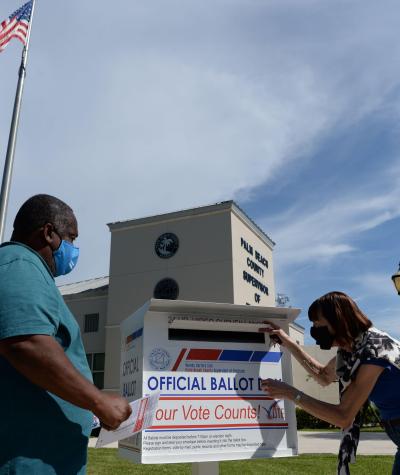Florida's Gov. Ron DeSantis signed the anti-voter bill S.B. 90 into law on May 6, 2021. This sweeping law decreases Floridians’ ability to exercise the freedom to vote by placing restrictions on vote-by-mail, drop boxes, voter registration and nonpartisan election protection and voter assistance efforts.
S.B. 90 Is An Attack on Vote-By-Mail
Under the old law, requests for mail ballots lasted for two general election cycles in Florida, unless the voter opted out. However, S.B. 90 mandates that voters apply to receive a mail-in ballot prior to every general election, meaning that voters would need to put extra effort into preparing to participate in an election.
The law erects more challenges to returning mail-in ballots by limiting drop boxes to early voting hours, significantly restricting the locations where drop boxes can be placed, barring election officials from moving or changing drop box locations within 30 days prior to the election and requiring in-person monitoring of drop boxes.
It also imposes harsh fines on nonpartisan election officials who try to make the process of using drop boxes more accessible.
These vote-by-mail and drop box provisions are reactionary and unnecessary changes. The number of people who vote by mail in Florida has nearly doubled over the last few election cycles. In 2020, 4.9 million Floridians vote by mail, up from 2.6 million in 2018, according to the state Division of Elections.
Notably, in recent elections, vote-by-mail has enabled greater participation among the state’s communities of color as well.
The number of Black voters who cast ballots by mail in Florida last year doubled – to more than 500,000 – from 2016 and 2018. Black voters also cast 11.4% of all vote-by-mail ballots in Florida in 2020, compared to 8.9% in 2016, according to All Voting Is Local.
S.B. 90 Undermines Voter Registration and Assistance Efforts
Additionally, this S.B. 90 undermines voter registration efforts. The law stipulates that third party voter registration groups must notify voters that they may not return their registration applications on time, despite the fact that they are required to do so by law.
This provision appears to be designed to confuse voters and discourage them from relying on third party groups to submit their registration applications.
S.B. 90 also negatively impacts volunteer efforts to assist voters waiting in long lines by implementing an unnecessarily broad and expansive definition for no-solicitation zones, which cover the 150-foot perimeter around polling places, early voting sites and even drop boxes.
This change prohibits individuals from providing food or water to voters in line, like the law recently enacted in Georgia.
Alarmingly, S.B. 90 also makes it more difficult for voters with disabilities and other homebound voters to give their mail ballots to designated third parties to deliver. The law criminalizes delivering or even “physically possess[ing]” more than two ballots for other voters, excluding immediate family.
Florida lawmakers opposed to S.B. 90 warned that this limitation disproportionately affects voters of color, who often rely on others in the community to assist with ballot delivery.
S.B. 90 Is Unpopular
S.B. 90 attacks methods of voting used by millions of Floridians that enjoy broad, popular support. At least 1.4 million voters submitted mail ballots in drop boxes during the 2020 election, according to a recent internal survey of counties by the Florida Supervisors of Elections.
According to a 2020 poll from State Innovative Exchange, 70% of Florida voters supported the use of drop boxes. Similarly, a 2021 Secure Democracy poll, which oversampled Republicans, found that 77% of Floridians wanted drop boxes to be both accessible and secure.
The eagerness of Florida lawmakers to sign S.B. 90 into law fits into a broader trend of state politicians ignoring Floridians' desires to make voting more accessible.
For example, in November 2018, a resounding majority of Florida voters passed Amendment 4 to restore voting rights to over a million Floridians. But then in June 2019, state lawmakers signed a law forcing people to complete the payment of fines and fees associated with previous convictions.
Campaign Legal Center (CLC) took action, representing hundreds of thousands of Floridians who were being prevented from exercising their freedom to vote in a long-running legal battle in an attempt to ensure that the will of Florida’s voters was enacted and that Floridians could make their voices heard in our democracy.
Florida Legislature’s Actions Are Part of A National Wave of Anti-Voter Legislation
CLC is also fighting on behalf of Americans around the country who are experiencing efforts by state legislatures to curtail their ability to vote due to falsehoods perpetuated about issues with the 2020 elections.
In April 2021, CLC sued the state of Georgia after its governor signed S.B. 202 into law, a piece of legislation that among other things, made it significantly harder to vote by mail and implemented new requirements and restrictions on the distribution of mail-in ballot applications by third party groups.
The freedom to vote is one of the most important freedoms that we are entitled to in this country. We must ensure that Americans can cast ballots so we are able to elect leaders who govern in our interests and make the promise of our democracy real for us all.
